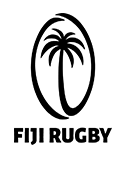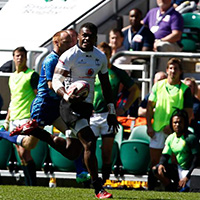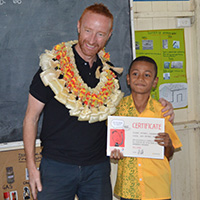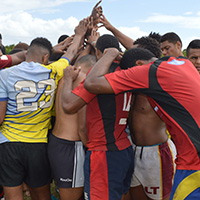Six legends to be inducted into World Rugby Hall of Fame
World Rugby has revealed that six legends of the game in Osea Kolinisau (Fiji), Humphrey Kayange (Kenya), Huriana Manuel-Carpenter (New Zealand), Cheryl McAfee (Australia), Will Carling (England) and Jim Telfer (Scotland) will be inducted into the World Rugby Hall of Fame in 2021.
The World Rugby Hall of Fame presented by Tudor recognises those who have made an outstanding contribution to the game of rugby throughout their careers, demonstrating rugby’s character-building values of integrity, passion, solidarity, discipline and respect on and off the field.
The six inductees excel within two themes selected by the Hall of Fame panel for 2021, rugby sevens and the Olympic Games in a big Olympic year, and the 150th anniversary of the first international match between Scotland and England in March 1871.
Sevens stars shining on and off the field
Kolinisau captained Fiji to their first-ever Olympic medal with gold at Rio 2016, while Manuel-Carpenter won silver with New Zealand as rugby sevens made its Olympic debut in Brazil.
Kayange also played in Rio but he and RWC Sevens 2009 winning captain McAfee (nee Soon) were members of the World Rugby bid team that convinced the International Olympic Committee members to elect rugby sevens to the Olympic programme in October 2009. This year, Kayange was elected to the IOC’s Athletes’ Commission and as an IOC Member, furthering rugby’s voice within the Olympic movement.
Celebrating the 150th anniversary of international rugby
In recognition of the 150th anniversary of the first international match, one player from England and Scotland will be inducted in former grand-slam winning England captain Will Carling and legendary former Scotland captain and coach Jim Telfer.
These six inductees will bring the number in the Hall of Fame to 154 since inception in 2006.
World Rugby Chairman and Hall of Fame inductee No.94 Sir Bill Beaumont said: “On behalf of World Rugby, I would like to congratulate our six Hall of Fame inductees, who did not just make their mark on the field of play, but who has played a significant role in advancing the sport.
“In this Olympic year, we are recognising those who have all played a significant role in cementing rugby as an Olympic sport. Their contributions should not be underestimated in terms of the global growth of rugby. We are also acknowledging the contributions of those who have left their mark on the oldest international fixture in the game.”
Fellow World Rugby Hall of Fame inductee (No.6) and Chairman of the Hall of Fame panel John Eales said: “The 2021 inductees for the World Rugby Hall of Fame are representative of all that is good in our game. Each of them have been outstanding players in either sevens or 15s and they have also been important contributors to rugby, in their own countries and globally, off the field.
“As Chair of the selection panel, I am so proud that the World Rugby Hall of Fame is able to recognise such worthy inductees, who have inspired generations of rugby players and fans through their many noteworthy achievements.”
The World Rugby Hall of Fame selection panel comprises Eales, secretary David Hands (England), Henri Garcia (France), Pablo Mamone (Argentina), Rob Cole (Wales), Anna Richards (New Zealand) and Wayne Smith (Australia).
For more information on the World Rugby Hall of Fame, visit www.world.rugby/halloffame.
World Rugby Hall of Fame 2021 inductees
No.149 – Osea Kolinisau (Fiji)
No.150 – Humphrey Kayange (Kenya)
No.151 – Huriana Manuel-Carpenter (New Zealand)
No.152 – Cheryl McAfee (Australia)
No.153 – Will Carling (England and British and Irish Lions)
No.154 – Jim Telfer (Scotland and British and Irish Lions)
OSEA KOLINISAU (FIJI)
Born: 17 November, 1985 in Suva, Fiji
An icon of Fijian rugby, having led the sevens team to Olympic glory in Rio in 2016 as well as back-to-back HSBC World Rugby Sevens Series titles in 2015 and 2016.
Kolinisau carried Fiji’s flag at the Opening Ceremony in Rio and scored the first of his team’s seven tries in the final as they defeated Great Britain 43-7 to win the gold medal – Fiji’s first ever Olympic medal of any colour. Later that year, he was nominated for the World Rugby Men’s Sevens Player of the Year award only to miss out to South Africa’s Seabelo Senatla.
The glue that knit the team together, Kolinisau captained Fiji from 2013-17. In addition to being an inspirational leader, Kolinisau was both a dangerous player in his own right and also very durable. He appeared in a record 62 events for Fiji on the World Series and his tally of 1,272 points is only bettered by fellow World Rugby Hall of Fame inductee Waisale Serevi.
One of his best performances came in the final of the Hong Kong Sevens in 2013, where he stepped off the bench to score a hat-trick of tries and help Fiji secure a famous comeback win against Wales.
Kolinisau retired from top level sevens in May 2017 before trying his hand at 15s in the USA, initially with Houston Sabercats and then briefly for Old Glory DC.
HUMPHREY KAYANGE (KENYA)
Born: 20 July, 1982 in Nairobi, Kenya
The Rio 2016 Olympic Games was a fitting stage for one of Kenyan rugby’s greats to bow out on.
A veteran of 12 HSBC World Rugby Sevens Series, from 2004-16, Kayange, along with his brother Collins Injera, was a mainstay of a Kenyan team feared for its strength and athleticism.
A Master graduate in Chemistry by profession, Kayange helped the Shujaa reach two Rugby World Cup Sevens semi-finals, in 2009 – the same year he was nominated for World Rugby Sevens Player of the Year – and again in 2013.
He also appeared at two Commonwealth Games, in 2010 and 2014, and was a member of the team that won Kenya’s first-ever World Series Cup title in Singapore in 2016. He finished his career on the World Series as Kenya’s third highest points scorer in sevens, with 799 points and 159 tries, while in 15s he scored four tries in 12 tests as a hard-running centre.
Even though Kenya failed to challenge for a medal at Rio 2016, the very fact rugby sevens was part of the Games’ programme was in some part down to Kayange, who as a member of World Rugby’s bid team, successfully presented the case for the sport’s inclusion to International Olympic Committee members in 2009.
In 2021, Kayange was elected to the IOC Athletes’ Commission and as an IOC Member.
HURIANA MANUEL-CARPENTER (NEW ZEALAND)
Born: 8 August, 1986 in Auckland, New Zealand
A tough athlete physically and mentally, Manuel was a brilliant dual international who knew her way to the try line for New Zealand in both sevens and 15s.
As captain of New Zealand women’s sevens, the Aucklander led the side to the inaugural HSBC World Rugby Sevens Series title and to Rugby World Cup Sevens glory in 2013, and was also captain when the side successfully defended the series title the following year.
Having overcome the setback of a serious ankle injury in 2014, Manuel went to the Rio 2016 Olympic Games and made a big impression, scoring tries against Kenya and France in the pool stage and in the semi-final against Great Britain. But she did not get the 30th birthday present she had wished for when playing against Australia, finishing with a silver medal, not gold, on her big day.
In 15s, Manuel was a two-time Rugby World Cup winner (2006 and 2010) and the centre had an impressive strike rate of 15 tries from 25 test appearances from 2005-14.
Rugby is in Manuel’s genes as she is one half of the first mother and daughter combination to play for the Black Ferns. Her mother, Liza Mihinui, played three games at hooker for New Zealand.
CHERYL McAFEE (AUSTRALIA)
Born: 23 September, 1975 in Auckland, New Zealand
McAfee’s place in Australian rugby history was assured when she led her country to glory in the inaugural women’s Rugby World Cup Sevens competition in Dubai in March 2009.
The dramatic sudden-death, extra-time victory over trans-Tasman rivals New Zealand concluded a successful tournament for herself and her team, with the quick-thinking back having announced her arrival at the tournament with a try in the first-ever game against China.
Later that year, McAfee’s pioneering spirit was embraced by World Rugby who invited her to become a member of the bid team that would successfully campaign for rugby sevens‘ inclusion in the Olympic programme.
A scrum-half in 15s, McAfee also captained her country with distinction in the longer format of the game, from 2007-10, including at Rugby World Cup 2010 in England, where her nine-year, 21-cap career in test rugby ended with a bronze medal.
In 2012, she joined World Rugby’s Rugby Committee, becoming a key voice in helping to drive forward policies that positively impact on the women’s game.
WILL CARLING (ENGLAND)
Born: 12 December, 1965 in Bradford-on-Avon, Wiltshire
As England’s youngest captain for 57 years, Will Carling presided over one of the most successful periods in the team’s history.
Choosing Carling as captain in 1988, aged 22 and just 10 months into his international career, was an inspired decision by England head coach Geoff Cooke.
The former Sedburgh pupil and Durham University psychology student led out England in 59 tests, winning 44, with back-to-back Five Nations Grand Slams achieved in 1991 and 1992 and again in 1995.
England also reached the Rugby World Cup 1991 final against Australia and the semi-final in South Africa four years later under his captaincy.
During his time in the test arena, Carling struck up a highly effective midfield partnership with Jerry Guscott, full of pace, strength and skill.
He scored 12 tries in 72 appearances in a nine-year England career, and was also capped on the British and Irish Lions tour to New Zealand in 1993.
JIM TELFER (SCOTLAND)
Born: 17 March, 1940 in Pathhead, Midlothian, Scotland
The former headmaster won 25 caps for Scotland, 10 as captain, and made eight test appearances for the British and Irish Lions, on two tours, in 1966 and 1968, before becoming one of the most revered coaches in the game.
A tenacious back-row forward in his six years at the top, from 1964-70, Telfer has the distinction of being the only Scotland international to have played New Zealand, South Africa and Australia without losing.
Upon hanging up his boots, Telfer coached the Lions on their 1983 tour to New Zealand, Scotland to the Five Nations Grand Slam in 1984 and, as assistant to Sir Ian McGeechan, to a second Grand Slam in 1990. After a break from coaching, Telfer was invited by McGeechan to become forwards coach on the triumphant Lions tour of South Africa in 1997.
Through his technical know-how and stirring motivational speeches, Telfer galvanised a Lions pack written off by the local Press and they laid the platform for a 2-1 series victory.
Telfer, with the assistance of John Rutherford and Hugh Campbell, was successful again in 1999 as Scotland claimed the last-ever Five Nations title under their management.






